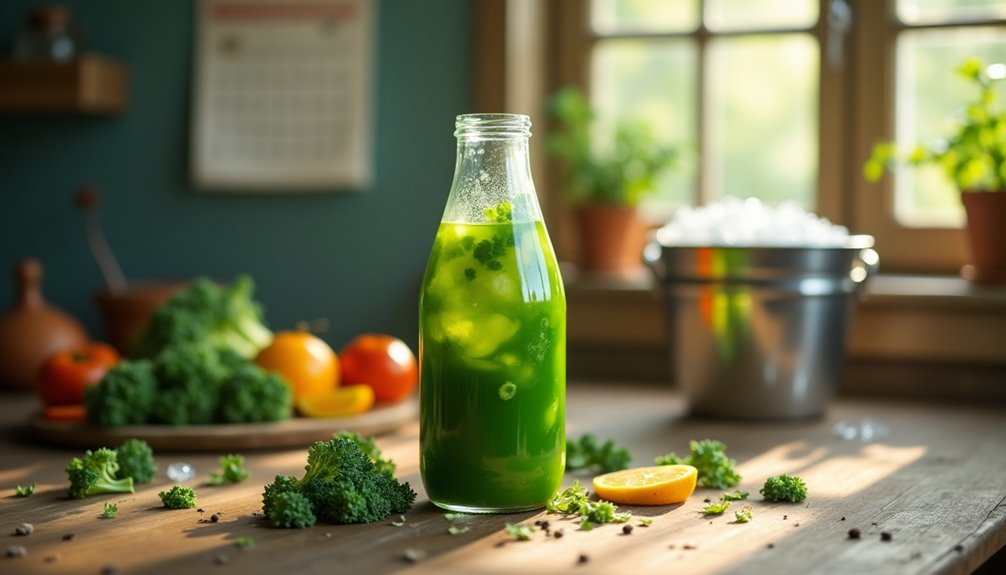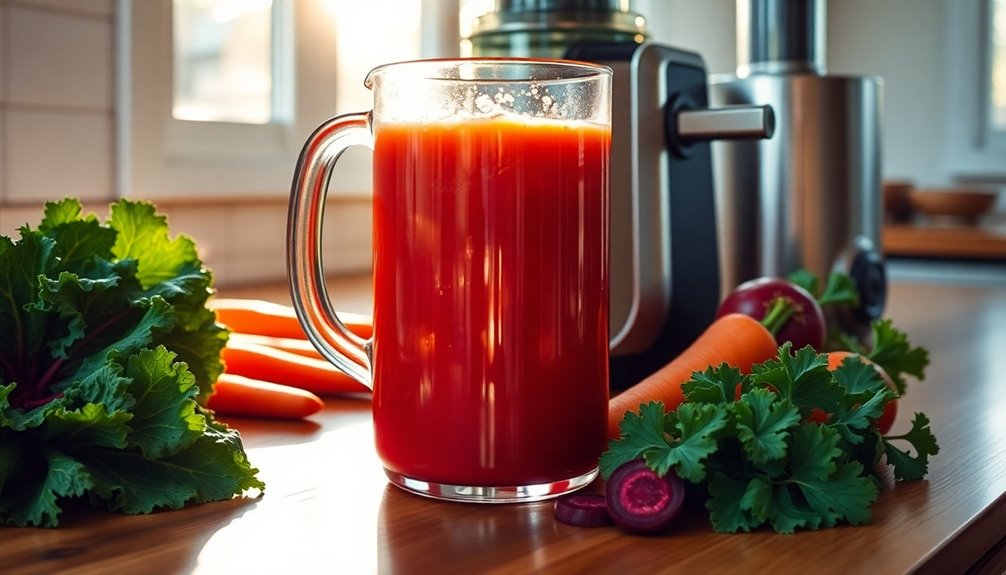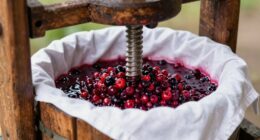You should ideally enjoy fresh juice immediately after juicing. However, if you store it properly in airtight glass containers, it can last up to 72 hours while retaining some quality and nutrition. The best taste and nutrient retention occur within the first 24 to 48 hours. To maintain freshness, minimize oxygen exposure and consider freezing for long-term storage. There's more to learn about optimizing your juice storage!
Key Takeaways
- Fresh juice is best consumed immediately, but can be stored for 24 to 48 hours for optimal taste and nutrition.
- Maximum storage time is up to 72 hours, though quality and nutrient content will diminish.
- Use airtight glass containers filled close to the top to reduce oxygen exposure and oxidation.
- Freezing juice preserves freshness and can extend storage for 2 to 3 months.
- Adding citrus before freezing enhances flavor and helps retain nutritional value.

Have you ever wondered how long you can store juice without sacrificing its taste and nutritional value? Fresh juice is undeniably best enjoyed immediately after preparation. However, life gets busy, and you might find yourself wanting to store your juices for later enjoyment. So, how long can you safely keep that juice in your fridge? Generally, you can store fresh juice for about 24 to 48 hours for optimal taste and nutrition. If you're pushing it, you might extend that up to 72 hours, but it's not recommended if you want to keep your juice tasting fresh and nutritious.
When you store juice, the method you choose can significantly impact its shelf life. Using airtight glass containers is essential. Glass is a great option because it doesn't leach harmful chemicals like some plastics can. Fill the container as close to the top as possible to minimize oxygen exposure. This is crucial because oxygen accelerates oxidation, leading to nutrient degradation. The longer your juice is exposed to air, the more its vitamins, particularly Vitamin C content, will diminish. Additionally, juices rich in vitamins A, C, and E promote skin health and can offer added benefits when consumed fresh.
If you're planning to make juice in bulk, remember that every minute it sits in the fridge can affect its quality. If you think you won't drink it within a couple of days, freezing is your best option for long-term storage. Freezing in portions allows you to thaw only what you need, ensuring the rest stays fresh. When stored properly in the freezer, your juice can last for up to 2 to 3 months, making it a practical solution for those who love to juice regularly.
When you freeze your juice, consider adding a piece of citrus, like lemon or lime, before you store it. This little trick can help boost the Vitamin C content and reduce nutrient loss during storage. Citrus not only enhances the flavor but also acts as a natural preservative, giving your juice an extra edge when it comes to maintaining its health benefits.
Ultimately, the key to enjoying fresh juice longer lies in how you store it. By using airtight glass containers and minimizing oxygen exposure, you can keep your juice fresh for a couple of days. If you need it to last longer, don't hesitate to freeze it in portions. This way, you can enjoy your homemade juice without compromising on taste or nutritional value.
Frequently Asked Questions
How Long Can I Store Juice After Juicing?
You can store juice after juicing for up to 24 to 48 hours in the fridge for the best taste and nutrition.
If you need to keep it longer, you can refrigerate it for a maximum of 72 hours before considering freezing.
To maintain freshness, fill glass containers near the top and seal them tightly.
Adding lemon juice can also help preserve Vitamin C and slow down oxidation, keeping your juice enjoyable longer.
How Do You Preserve Juice From a Juicer?
Did you know that freshly made juice can lose up to 50% of its nutrients within just a few hours?
To preserve juice from a juicer, store it in airtight glass containers in the fridge. Adding citrus like lemon can help maintain Vitamin C levels. Fill your containers close to the top to minimize oxygen exposure, and avoid plastic.
For long-term storage, freeze small portions, allowing space for expansion.
Do You Have to Drink Juice Immediately After Juicing?
You don't have to drink juice immediately after juicing, but it's best if you do.
Freshly made juice retains the most nutrients and flavor when consumed right away. If you need to store it, keep it in an airtight glass container in the fridge for up to 48 hours.
Adding citrus like lemon can help preserve its vitamin content. Just remember, the longer it sits, the more nutrients and taste it loses.
How Long Are Juices From Pressed Good For?
Juices from pressing can be good for about 24 to 48 hours when stored properly in airtight glass containers in the fridge.
If you keep them in a cool environment, they might last up to 72 hours, but the nutrients start to degrade after that.
To extend their freshness, consider adding some citrus juice, which helps slow down oxidation and boosts Vitamin C.
Always minimize air exposure for the best results.
Conclusion
In the grand tapestry of health, freshly juiced liquid sunshine brings vibrancy to our days. But remember, like a fleeting sunset, juice is best enjoyed in its prime—ideally within 24 hours. Beyond that, it begins to lose its brilliance, fading into a dull shadow of its former self. So, savor every drop, and let each sip be a reminder that freshness is fleeting, urging you to embrace the present and nourish your body while you can.
Cindy thoroughly researches juicing trends, techniques, and recipes to provide readers with practical advice and inspiration. Her writing style is accessible, engaging, and designed to make complex concepts easy to understand. Cindy’s dedication to promoting the advantages of juicing shines through her work, empowering readers to make positive changes in their lives through the simple act of juicing.











